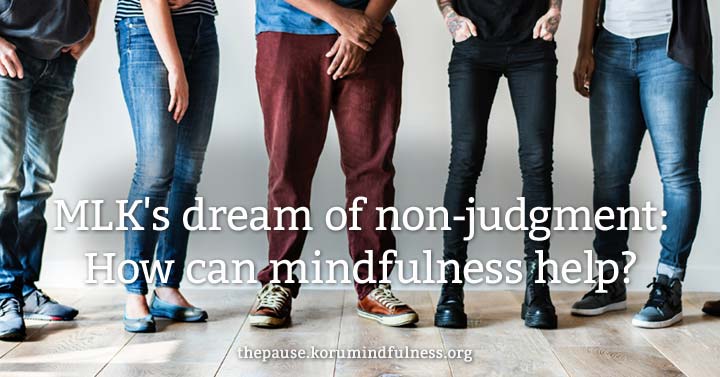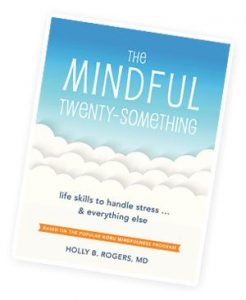
I have a dream that my four little children will one day live in a nation where they will not be judged by the color of their skin, but by the content of their character.
MLK, Jr.
For better and worse, our human brains are judging machines. Most of us have the mental habit of dividing our experiences, automatically and immediately, into compartments of good, bad, or neutral. Without even noticing, you are probably going around habitually assessing and assigning value to virtually every thing/person/experience that crosses your path. These automatic assessments and assumptions lie at the heart of some of our most unhelpful biases, stereotypes, and self-imposed limitations.
Trapped by Our Judgments
All of us make these automatic judgments. It’s simply the way our brains work. Because we don’t typically notice them, they are like programs running constantly but unobserved in the background, controlling us without our awareness or consent. Sort of like bits of malware built into our nervous systems.
These judgments and assumptions are like bars in a cage you build around yourself, limiting you in one way or another. If you don’t notice or question thoughts like, I don’t trust people who look like that or I don’t like people who believe this, then you limit your connections in life and miss opportunities to learn and grow. You stay trapped in your cage of pre-conceptions, missing out on some of life’s great moments, and perhaps causing pain to yourself and others.
The kind of freedom that MLK dreamed of, a country and culture where individuals are not judged by the color of their skin, is only possible when each of us learns to free ourselves from the trap of our own judgments. One way to do this is through the practice of mindfulness. Mindfulness practice allows you to become aware of your biases and pre-conceptions. It allows you to hold each one up to the light of day, to be examined and possibly discarded. This is how we can all begin to dismantle our traps.
Escaping the Trap
Ruth King, in her powerful book, Mindful of Race, talks about how mindfulness and meditation can be helpful in freeing ourselves from the conscious and unconscious patterns that are activated when we engage with others who represent races or ethnicities that differ from our own. She says:
The practice of mindfulness meditation supports us in experiencing more mental ease and harmony… it offers a way for us to slow down and investigate our experiences with care and wise attention…We can notice, for example, how racial perceptions live, what thoughts we are giving birth to, and how we feel thinking about them. We can acknowledge where we get stuck and discover what supports letting go.
A natural outcome of a regular meditation practice is that we become skilled at noticing without buying into, the constant flow of judgment produced by our human minds. As our meditation practice trains our minds to observe and release judgments, freedom from our personal patterns of racial bias begins to occur.
I remember when I first began meditating I was distressed by the number of cynical, critical thoughts floating by in my head. With practice, I learned to notice and release judgments, and over time, just as my teacher had promised, the negativity slowly abated.
Years later, when I began to open my awareness more intentionally to my own patterns of racial assumptions and biases, I again was distressed by what I saw. Beneath my expressed and cherished attitudes of interest in and acceptance of all, lay contrary reactions that were unpleasant for me to recognize. Though out of my awareness, they were influencing my behaviors and responses in ways I did not like or approve of.
Over time, with compassionate, patient meditation practice, my increasing awareness has led to increased freedom from these unconscious biases. I am now much more likely to recognize subtle bias in my mind before I act on it in word or deed.
I am very, very far from being perfectly unbiased, but my awareness has helped me move, ever so slightly, in that direction, the direction we all must move in if we are ever to realize Dr. King’s dream of a society where individuals are not judged by the color of their skin.
Today, I will honor Dr. King’s birthday, by spending time in quiet contemplation, increasing my self-awareness, uprooting the weeds of racial bias, and planting in their place the seeds of understanding and compassion. Please join me in this effort!
Use the comments section below to share how your mindfulness practice has helped you to grow. .
Get our latest articles in your inbox.

Holy, thank you so much for this entry. It feels like the perfect balance of wise observation, personal reflection, and recognition of small movements in body and mind turning into big, beautiful rays of light and liberation for one and all. Just small changes in course can leave us in very different places years and years and miles and miles later. Sometimes that initial small correction is almost all the effort that is needed, the rest flows naturally. Here’s hoping we can all make wise, small movements in intention that bloom ever so brilliantly, in the spirit of Dr. King’s dream.